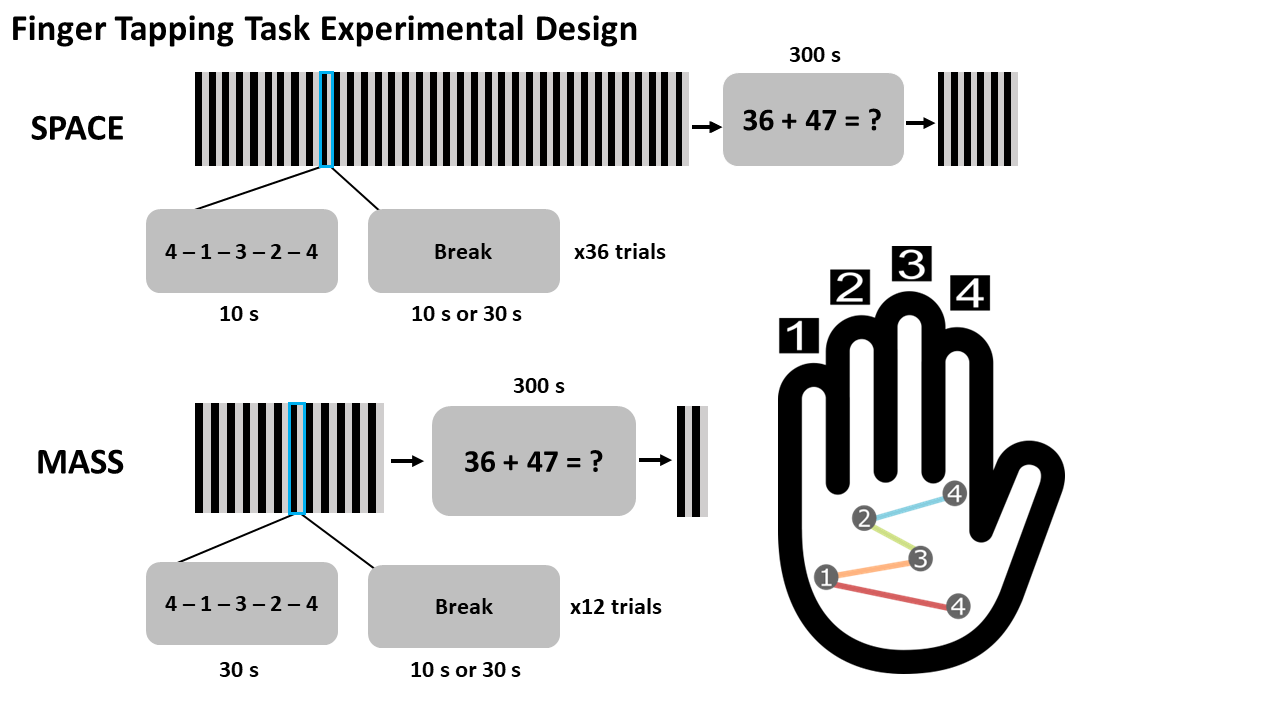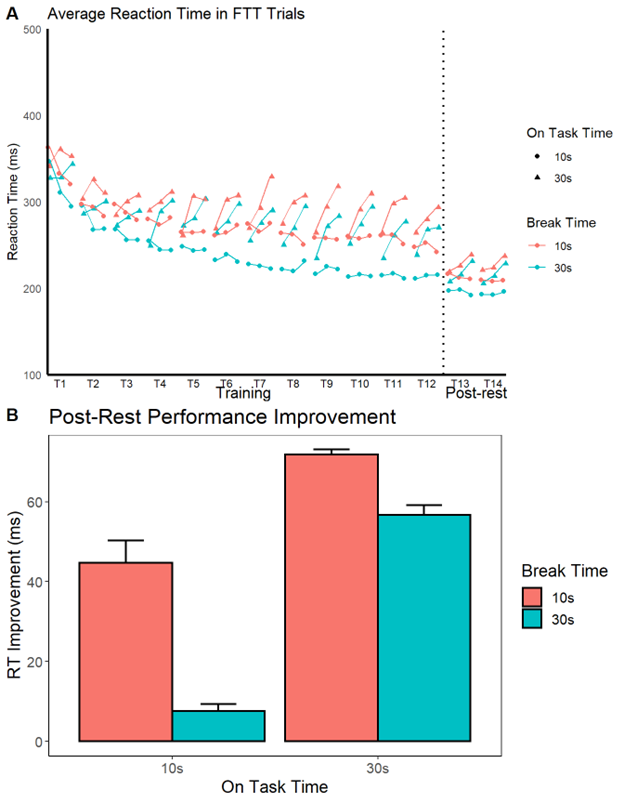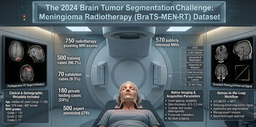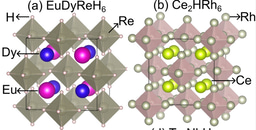When does motor learning occur? Intuitively, like declarative learning, one would think that it would occur concurrently with the task. However, for the past 20 years, researchers have been proponents that motor learning can occur offline (not concurrently with the task). We’ll call this the consolidation account. This account has been supported by the repeated finding that there are performance improvements after rest, whether after sleeping (e.g. 12 hours), 5 minutes, or most recently, 10 seconds. Some researchers have gone so far to say that “much, if not all” motor learning occurs offline [1-3]. However, our lab, along with others , have shown that the evidence for motor learning occurring during sleep is scant [4-8]. In this study, we set out to provide an alternative account to the claim that learning occurs during a 300 s rest period.
A core factor that has been ignored in studies claiming that learning occurs during offline periods is reactive inhibition (RI). RI is the worsening of performance as online task time continues. RI builds up as online task time increases and dissipates during breaks between trials. The more RI there is, the worse the performance. The current study set out to test both the RI account and the consolidation account as an explanation for post-rest improvements after 5 minutes.
We did this in a standard finger tapping task where participants repeatedly typed 4-1-3-2-4 for either 10 s or 30 s trials. Between trials, participants either had 10 s or 30 s breaks (figure 1). After 360 s of practice, participants had a “break” of 300 s where they performed double digit addition. After, participants performed the same finger tapping task for 60 s.

Figure 1. Participants repeatedly typed 4-1-3-2-4 over trial. They were randomly assigned to one of four groups with either 10 or 30 s trial lengths and either 10 or 30 s break lengths.
We replicated past findings of RI during the task (e.g. the worsening of reaction time during the trial in figure 2a). We found that both on-task trial time and break time significantly affected the amount of post-rest increase. As predicted by the RI account, the longer the trial and the shorter the breaks, the greater the post-rest improvement and vice-versa (figure 2b). With a novel additional assumption to the consolidation account, it too was able to predict a similar pattern of results. Also of note, we found evidence that RI exists in the 10 s on-task trial, 10 s break group. This is the same group used in Bönstrup et al., (2020) and Buch et al. (2021), which raises the possibility that their claims of learning during 10 s breaks may in fact be due to the accrual and dissipation of RI.
Our findings add to the mounting evidence that challenges a 20 year old idea that motor learning can occur offline.

Figure 2. A) Each point represents 10 seconds of on-task trial time. In the 30 s on-task trial time condition, the triangles connected by lines are not separated by breaks. In the 10 s on-task trial time condition, each circle is separated by a break, even if the line connects them. B) The y-axis shows the amount of RT improvement after the rest. The x-axis indicates the amount of on-task trial time, whereas the color indicates the amount of break time. Holding the amount of on-task trial time constant (x-axis), break time has a strong effect on the amount of RT improvement. When the break time (color) is held constant, on-task trial time also has a strong effect on RT improvement. Error bars in standard error.
References
- Robertson, E. M. (2019). Skill Memory: Mind the Ever-Decreasing Gap for Offline Processing. In Current Biology (Vol. 29, Issue 8, pp. R287–R289). Cell Press. https://doi.org/10.1016/j.cub.2019.03.007
- Bönstrup, M., Iturrate, I., Hebart, M. N., Censor, N. & Cohen, L. G. Mechanisms of offline motor learning at a microscale of seconds in large-scale crowdsourced data. Npj Sci. Learn. 5, 1–10 (2020)
- Buch, E. R., Claudino, L., Quentin, R., Bönstrup, M., & Cohen, L. G. Consolidation of human skill linked to waking hippocampo-neocortical replay. Cell Reports, 35(10) (2021). https://doi.org/10.1016/j.celrep.2021.109193
- Rickard, T. C., Cai, D. J., Rieth, C. A., Jones, J. & Ard, M. C. Sleep does not enhance motor sequence learning. J. Exp. Psychol. Learn Mem. Cogn. 34, 834–842 (2008).
- Brawn, T. P., Fenn, K. M., Nusbaum, H. C. & Margoliash, D. Consolidating the effects of waking and sleep on motor-sequence learning. J. Neurosci. 30, 13977–13982 (2010).
- Pan, S. C., & Rickard, T. C. Sleep and motor learning: Is there room for consolidation? Psychological Bulletin, 141(4), 812–834 (2015). https://doi.org/10.1037/bul0000009
- Nettersheim, A., Hallschmid, M., Born, J., & Diekelmann, S. (2015). The Role of Sleep in Motor Sequence Consolidation: Stabilization Rather Than Enhancement. Journal of Neuroscience, 35(17), 6696–6702. https://doi.org/10.1523/JNEUROSCI.1236-14.2015
- Rickard, T. C., Pan, S. C., & Gupta, M. W. Severe publication bias contributes to illusory sleep consolidation in the motor sequence learning literature. J. Exp. Psychol. Learn Mem. Cogn, (2022). https://doi.org/10.1037/xlm0001090
Follow the Topic
-
npj Science of Learning

An online open access peer-reviewed journal dedicated to research on all aspects of learning and memory – from the genetic, cellular and molecular basis, to understanding how children and adults learn through experience and formal educational practices.
Your space to connect: The Psychedelics Hub
A new Communities’ space to connect, collaborate, and explore research on Psychotherapy, Clinical Psychology, and Neuroscience!
Continue reading announcementRelated Collections
With Collections, you can get published faster and increase your visibility.
Reimagining Teaching and Learning in the Age of Generative AI Agents
Publishing Model: Open Access
Deadline: Jul 13, 2026




Please sign in or register for FREE
If you are a registered user on Research Communities by Springer Nature, please sign in